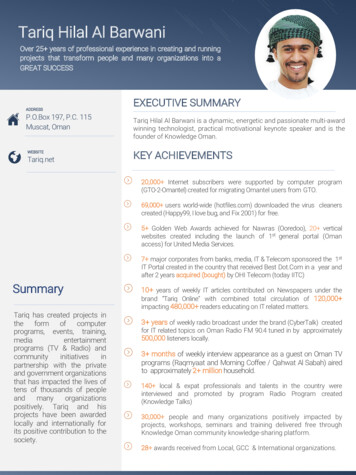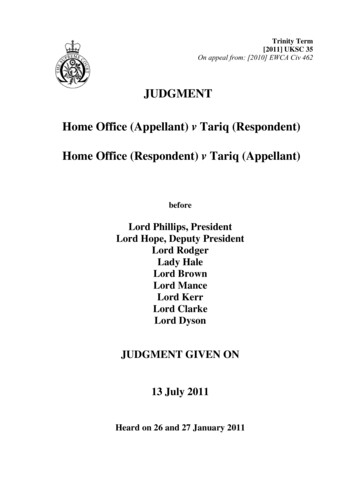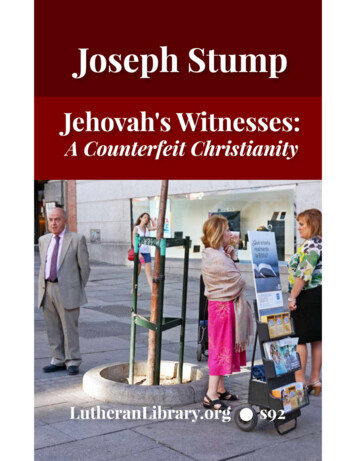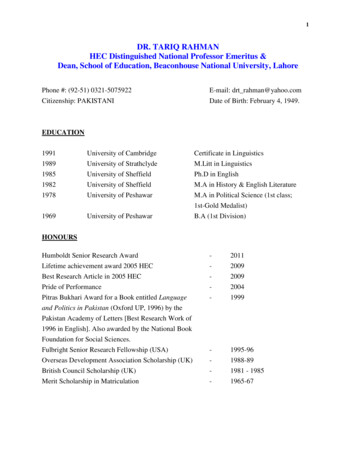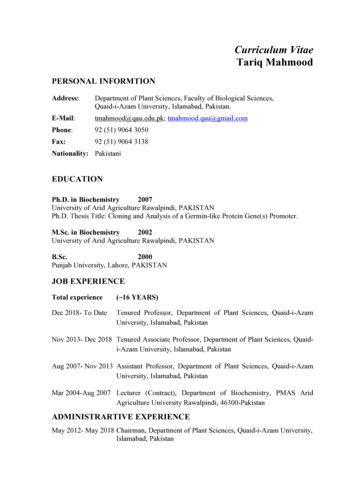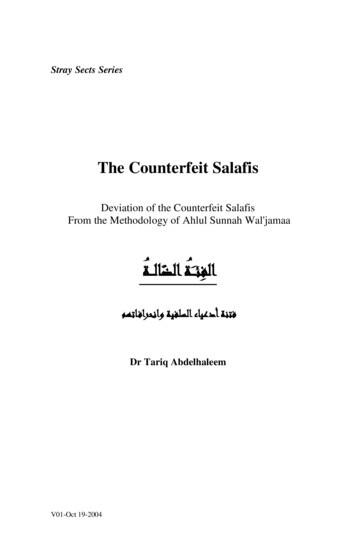
Transcription
Stray Sects SeriesThe Counterfeit SalafisDeviation of the Counterfeit SalafisFrom the Methodology of Ahlul Sunnah Wal'jamaaُ ـة ُ الفُ ئ ـُ ـةُ ُ الضُ ال ـ ُ ـاتهم ُ فتنةُ أدعياءُ السلفيةُ وانحراف Dr Tariq AbdelhaleemV01-Oct 19-2004
Stray Sects SeriesThe Counterfeit Salafis1
Stray Sects SeriesThe Counterfeit SalafisDar Al-arqam PublicationsToronto, CanadaRamadan 1st, 14252
Stray Sects SeriesThe Counterfeit Salafis“Allah loveth not that evil should be noised abroad in public speech,except where injustice hath been done; for Allah is He Who heareth andknoweth all things.” Al-Nisaa 48“The Problem with this counterfeir salafi’ group is not only the wrongapplication of an Islamic Principle; it is rather the wrong iterpretatuionand complete dowmplay of a major pilar of the concept of Tawheed;Ruling with the Laws of Allah in the lives of the Muslim Ummah.The spread of such Bidaa slows down the revival of the Ummah andmakes Islam much weaker player amongst nations of the world. This isnot the message of Islam. This is not the stand of the followers andsuccessors of the Prophet ”.ُُ فيُ مجردُ خطأُ تحقيقُ مناط ُُ افُ الذيُ وقعتُ فيهُ هذهُ الفرقةُ الُ يكمن ُ "إنُ خطورةُ اإلنحر ُ ـاطُ أحدُ أركان ُ ُ وإنماُ يكمنُ بشكلُ أساسيُ فيُ ُ إسق ، "الحكم ُ بماُ أنزلُ هللا"ُ فيُ هذاُ العصر ُ ُ وهوُ ماُ يتجاوزُ في ،ُ فيُ مكانةُ اإلذعانُ التامُ ألحكامُ هللاُ فيُ حياةُ األمة ُُ ُ الذيُ يتمثل ، التوحيد ُ ُ ويتناقض ُ مع ُ رسالة ُ اإلسالم ُ كما ُ أدُ اها ُ رسول ُ هللا ، أثره ُ الضار ُ أخطار ُ اإلرجاء ُ التقـليدي ُ نحوُ استعادة ُُ ُ مماُ يعرقـلُ مسيرةُ األمة ، وكماُ حملتهاُ ُ األجيالُ المتعاقبةُ منُ أهلُ السنةُ والجماعة ُ ُ " مكانتهاُ التيُ أرادهاُ هللاُ سبحانهُ لهاُ فيُ قيادةُ البشريةُ نحوُ حاضرُ آمنُ ومستقبلُ واعد من " وهل يكب الناس على وجوههم في النار إال حصائد ألسنتهم .": قال رسول هللا رواه أحمد وبن ماجة ، حديث معاذ بن جبل رضى هللا عنه From theHadith of Mu’aaz Ibn Jabalsaid: The Prophetsaid: “ does people tumble on their faces in hellfire (for anyreason) other than what their tongues have harvested” Ibn Majah &AhmadIntroduction3
Stray Sects SeriesThe Counterfeit Salafis ونعوذ باهلل من شرور أنفسنا ومن شيئات ، إن الحمد هلل نحمده ونستعينه ونستغفره ونستهديه ونصلى ونسلم على سيدنا محمد ، ومن يضلل فال هادي له ، من يهد هللا فال مضل له ، أعمالنا وعلى آله وصحبه وبعد At the turn of the 20th century, the Muslim Ummah was hit byan evil that can only be compared to the major Fitna ofassassination of Othman ( ) or the Fitnah between Ali ( ) andMu’awiyah ( ); namely the collapse of the Khilafah system inthe wake of WWI. After eighty years of this catastrophe, itsimpact is still unfolding in the lives of Muslims. It is beyondthe scope of this book to explain such an impact. However, themost significant outcome of this catastrophe was the demise ofthe Islamic state altogether. Muslims ceased to have a corestate1 around which their collective effort can be of significanceto all. Instead, weaker and smaller states have emerged toreplace the Empire which safeguarded the Islamic Culture,Laws and Unity for 1400 years. However, it took the Islamicworld a few years after this catastrophic to realize the awkwardand dangerous situation which it found itself plummeting into.It was the first time in its history that it faced such situation.The reaction to this situation situation varied throughout theIslamic world. In the absence of a central authority that puts thegreat principle of “Commanding Good and Preventing Evil wasput into action by the establishment of what is known as the“Islamic Movements”. The first to appear was the movement of“AL-Ikhwan Al-Muslimoon” in Egypt by Hassan Al-Bana(May Allah rest his soul in peace), followed by AL-Jamaa AlIslamiyah in Pakistan by Abu Al-A’ala Al-Mawdudi (May Allahrest his soul in peace). This was not a first in the Islamic historywhere Muslims organize to enforce the principles of“Commanding Good and Preventing Evil” in the absence of a1See the significance of the core state to the survival of cultures in generalwas highlighted by Ibn Khaldoon in his “Introduction”, and most recently bySamuel Huntington in his book “The Clash of Civilizations” P2074
Stray Sects SeriesThe Counterfeit Salafiscentral authority to do it in the proper way. Among suchmovements, two were established at the time of Al-Mamon AlAbbasi, one led by Khalid Al-Daryoush, and the other by SahlIbn Salamah Al-Ansari to enforce the Laws of Islam afterchaotic erupted in Baghdad in the wake of Al-Aminassassination2.However, these movements quickly discovered that theproblem with the new reality of the Muslim land was not onlythe absence of an authority that puts the great principle of“Commanding the Good and Preventing the Bad” into action,but it was the absence of the Islamic Laws altogether in thelives of Muslims, and the subsequent replacementing of SacredLaws with Secular, Man-Made lawsIt was only logical that Muslims spent sometime determiningthe exact ruling on the new reality of the Land of Islam. Theinterpretation of such reality was not easy to comprehend. Itwas altogether new to the rulings of Fiqh and the Fiqh of realitywhich are the two requirements of Fatwa. The one and onlytime which Muslims were faced with a similar situation wasduring the invasion of the Mongolians in Baghdad and theEastern Islamic parts of the Abbasi Empire. Ats that time,Sheikhh Al-Islam Ibn Taymiyah gave the ruling of in such asituation wheren Man-made Laws overtake and govern the landof Muslims.It is essential here to bring up a point, which I found totallymissed in all the literature that dealt with this situation, that isthe way the Islamic laws were applied during the history ofKhilafah and the format of the Law in the present time. Theproper understanding of the difference between the twomethods will cast light on the rulings that the books of Fiqh had“Lectures in the History of Islamic Nations, Abbasi State” By Skeik AlKhudary p18125
Stray Sects SeriesThe Counterfeit Salafisreflected in that regard versus the ruling of the Man-Made Lawsof the present time.Following the establishment of the first Islamic state inMedinah,led by the Prophetand during the 1325H yearsafterwards, the application of the Islamic Laws was merely bythe “practical submission” of the Khalifas to the rulings of thescholars and Mujtahidoun of the people of Fiqh “Fuqaha’a” inall matters pertinent to shariat. When a Khalifah, or a ruler,wanted to do some thing that is not in accordance with shariat,following his desire, he just make an “executive” order to carryit out, such as seize a piece of land or property. There was nowritten constitution which states that the Law of the Land is theIslamic Law; as it was obvious to all that this was the essenceof submission to Allah . Even the ruling of Fuqaha’a, werenever called Laws, as there is a difference between the ‘Law” inits contemporary meaning, and the Fatwa in the Islamic sense.The only way of a Khalifah to break up shariat, as the case inthe contemporary states, was to denounce it altogether. Therewas no written social contract that is known nowadays as the“constitution” other than the inherited understanding ofTawheed that Shariat is the Law of the land. That is why in allthe history of the Islamic state, the scholars and Mujtahidounruling were about a completely different situation that has nosimilarity with whatever Muslims are experiencing in thepresent. The transfer from that status of “the Laws as ‘Fiqh”that is documented in the books of fiqh of one of the Mathhabs,on the basic knowledge that it is the Law of the land andaccepted by the rulers and Khalifas, to “Laws” status that aredocumented as the official “Law of the Land”, based on awritten constitution that specifies its sources, has happened overalmost 100 years since the invasion of Napoleon Bonaparte toEgypt at the time of Muhammed Ali of Albania. The invasionled to the Sultan to drift into the policy of modernization of theMuslim state, and inviting “specialists” in all fields of scienceand arts to help carrying out the mission, amongst which manyof them were “orientalists”. The European countries at that time6
Stray Sects SeriesThe Counterfeit Salafiswere strong. They insisted on establishing separate courts,known as the ‘mixed courts” in the lands of Muslims, wheretheir citizens used to be prosecuted instead of being prosecutedin accordance to shariat in Shariat courts! The “Mixed courts”existed in parallel with the shariat courts for decades. Also, dueto the “modernization” process, it was decided by the sultan ofEgypt to formulate the Islamic Fiqh into the “Law” format andcategories it to the known forms of Law such as criminal, civiland the like. An official Magazine of Law that is called “TheMagazine of the Just Laws” was the place where these shariatlaws published. At the wake of WWI, the shariat courts gotweaker, and the Muslims were permitted to attend to the mixedcourts in some of the aspects of life. By mid 50’s the shariatcourts were completely abandoned and the secular laws thatwas used in the mixed courts took over completely3. This waspoint of the complete break down of Shariat in the IslamicLand.It is obvious that at the old time, the unwritten constitution wasthe Shariat of Allah that rulers in the lives of Muslims, withthe consent of the rulers, even with some practical deviation,which Ahlul Sunnah call sins.That is the situation were all the quotes of the Fuqaha’a dealswith in the known Islamic fiqh books. And, that is why it isirrelevant, as we argue here, and as many of the great scholarsof Ahlul Sunnah we quoted argued, to apply these statementswithout going back to the “reality” or the ‘situation” مناط ofsuch rulings. Failing to watch such difference is a completefailure of the judgment of such point.However, back to the point of Islamic Movements in thecontemporary time, many movements have been shaped to leadthe Muslims in such age where shariat is no more in control,see more details in “The Situation of the Contemporary Law betweenShariat and the Man-Made Lwas”, Tariq Al-Bishry, P1437
Stray Sects SeriesThe Counterfeit Salafisand where most of the Muslim Land is ruled by Secular ManMade Laws.It happened that some Muslims, belong to few Islamicmovements, failed to see the difference that we have justdescribed, and most Muslim scholars realized the difference inthe ‘Reality or Situation”. Amongst those who failed todifferentiate between the two situations, a group of people callthemselves “Al-Salafiyoon”. However, that failure was not theironly gaffe. They added to that failure, a bad attitude toward therest of the scholars who noticed such difference. On top of that,they attracted some young Muslims, using Sufism approach ofignorance and submission, to blindly follow their lead. Theyalso terrorized scholars of Ahlul Sunnah and bad-moused manyof them.If it was only the mistake of not having the write reading of thetext of Quran and Sunnah, and the wrong application of theHukm of Shariat in “Reality of situation”, it would have beeneasy to digest and possible to fix. But, adding all these faultsmade them a real danger to understanding Tawheed and a badexample for the coming generation to follow.In this book, we have categorized those claim to follow the“Quran and Sunnah” and the way of AL-Salaf in general intoeight groups. We have discussed in brief their opinions inspecific issues which they fundamentally differ about. That wasonly on the purpose of extinguishing between those who tookthe wrong turn, and the adopted the wrong views, and thosewho either adopted the wrong views did not drift into the wrongattitude toward others and also those who had the guidance ofAllah in following the right rulings.It is rather sad to see some of our youth being misled by suchwrong views. It weakens the Ummah and its prospect to regainits status on Earth as the leader of the Human kind to just, fairand moral life, as Allahwanted for it. They are only but8
Stray Sects SeriesThe Counterfeit Salafispassive, retreated, spy-minded, ignorant followers that have, ontop of that arrogance over the real Sheiks of Islam! I have beenamazed for some time that some one can be ignorant and, in thesame time is arrogant. However, the simulation between thetwo words in English ‘Arrogance vs. Ignorance” (thecompletion of letters in both words) put my mind in ease andshowed me the connection.However, as Sheik Bakr Abu Zaid said in “Al-Tasaneef” p 41,about this Bidaa:“It is a comfort that this is a “sickness” that is rushing to fade, and astrange lunacy that will go down soon, and to return to the Jamaa ofIslam is to know that: These splitting rows live without followers4 as Allahsaid“And the unjust people have no followers”.These people have no case to defend, and their struggle is justa jump of the “rebellious” that is why you find a ‘thugs”attitude in their stands, and without guidance This Lunacy will – with the guidance of Allah – will go down,and will lose its shadow, and will be chocked. The rebellionwill come back to the rows of Ahlul Sunnah InshaAllah,reciting the Ayah “Oh Lord save me from the unjust peole”.The real “Salaf” of these people are the like of Abu Ghodah andhis master Al-Khawthari, as they bread and flourish on backbiting and eating the flesh of the scholars of Ahlul Sunnah,whom, in the scale of Allah , weigh a whole world of the likesof those counterfeits.It the Sunnah of Allahthat such bubbles does not survive.Such groups carry the seed of their collapse in their verymethodology! They raise followers that can not replace them asthey are taught to listen only to their masters and never to think.It is a group that has no future, Walhamdullelah.4this means that they have followers that are blind of seeing any light, asthey were raised like Sufis, to follow without any brain work.9
Stray Sects SeriesThe Counterfeit SalafisDr Tariq AbdelhaleemRamadan 1st, 1424October 15th, 200410
Stray Sects SeriesThe Counterfeit SalafisChapter OneTerminology and Necessary definitionsThis subject, amongst many others, is poorly presented, if at allpresented to the English speaking Muslims. It is rather sad thatmany of the non-Arabic speaking Muslims in Europe and NorthAmerica have no, or very little, references to guide them onboth the academic level and the practical level. This paper isintended to explain the main principles, terms of references ofthe main streams of some of the modern Islamic "Schools ofthought". It will also explain the stand of these groups in majorcontemporary subjects (democracy, governments, etc.). Thesegroups might have some common ground, although they arecompletely different in many details when it comes to theapplication of the theoretical principles of the Islamic thought.Al-SalafiyahThe term Salaf in the Arabic language means in its generalsense "the late", or "what is before, and in more specificmeaning "the predecessor". However, this term has been usedby the Muslim Scholars of Ahlul Sunnah5, since the time ofAhmad Ibn Hanbal to point to the good predecessors of the firstthree generations that were mentioned din the Hadith of theProphet : "The best generations are those of my generation6,then those who follow, and then those who follow"7. The'Goodness" of the three generations mentioned in the Hadithsignifies that these are the best followers of the Sunnah of the5We use the term "Ahlul Sunnah" here to distinguish between them and theShiat and the other theorists of the 72 innovation sects. However the term willbe closely explained later in a different capacity.6 The word "Qarni" in Arabic, which literally means "my century" istranslated here as 'generation" as this is the meaning in which the word is usedin that context. This meaning is within the capacity of the word.7 The hadith is reported by Al-Boukhari, Muslim, Al-termizie, Ibn Majah andAhmad.11
Stray Sects SeriesThe Counterfeit SalafisProphet . The term was widely used by almost all of AhlulSunnah scholars over the history of Islam.However, in recent years, following the decline of the Khilafah,the map of Islamic politics has completely changed.Secularism8 has taken over in shaping the Laws of almost all ofthe Muslim countries. The Governments of Muslims haveopenly adopted secularism as the alternative to Islam, and inalmost all of the constitutions of theseGovernments it refers to Islam "one of the sources oflegislation" as opposed to as "the one and only source oflegislation" in accordance with the basic principles of Tawheed.However, one exception to that is the constitution of theKingdom of Saudi Arabia, where it states that it follows theQuran and Sunnah and it derives all its laws in accordance withIslam. This has been the stand of the Saudi government andofficials, but however has also been opposed by manyopponents of the Saudi system on the bases that although theSaudi government claims that stand in the constitution, but inreality they legislate many laws that are derived from secularsources9.Al-SalafiyoonDuring the seventies, the decade that is perceived as "theDecade of the Islamic Revival", and with the emergence of thecontemporary Islamic movement in Egypt and the Arabpeninsula, the term "Salafi" and 'Al-Salafiyoon"10 emerged tosignify a specific group of people with a specific mandate. Itwas first used by the group of Egyptian "shaiks" such as8Secularism is the "worldly" vision of the universe. It is defined in theEnglish dictionaries as "indifference to or rejection or exclusion of religionand religious considerations". However, it was translated at the end of the19th century to the Arabic language to "Scientific" !علمانية Just to make it moreacceptable to the common ignorant Muslims.9 It is beyond the scope of this study to cover this point or to reach a verdict insuch matter.10 Those who follows the Salaf.12
Stray Sects SeriesThe Counterfeit SalafisMohamed Ibn Ismail of Alexandria, and later by Muqbel AlWadie of Yemen11. They were students of Hadith, and havebased their legitimacy in the Islamic movement12 as being thefollowers of the group that was known in the history of Islamicthought as 'Ahlul Hadith" as opposed to those of "Ahlul Raie"13.However, the term "Salafis", rather than Ahlul Hadith, wasused to label them and their followers. At that time, there wereother groups that used to follow the same base – adherence tohadith and sunnah in general, but with other interpretations ofthe mandate of Sunnah when applied to the present situation.These differences have given way to the emergence of otherschools of though, that can either being labelled under the"Salafi" term, as they still follow the Salaf, or, as they prefer tocall themselves, Ahlul Sunnah Wal-jama'a.Ahlul Sunnah Wal'jama'aThe term Ahlul Sunnah Wal-jama'a points to those who agreeto the principles of Tawheed in its two categories; AlRuboobiyah and Al-Uloohiyah. It is essential to mention thateach of these terms is not completely exclusive to a certaingroup. Also, terms were sub-categorized on bases of the subjectin question. For instance, the term Ahlul Sunnah points out tothose who follow sunnah rather than Bidaa. It is thendistinguish between The Sunnis and the Shiat or the Mutazilat.However,11They were students of Al-Albani.I use "movement" here to point out a group rather than a "movement"which requires more organization and disciplined followers, and that normallyhave a political agenda attached to its academic approach.13 Ahlul Raie in the Islamic thought are those who used the Qiyas "logicaldeduction" widely as opposed to Ahlul Hadith who relied more on the hadith,and accepted hadith as a higher evidence than Qiyas even if it is categorizedas Daif. However, Ahlul Raie term in the contemporary schools of thought,are those who does not follow the evidence of Shariat in general, but they justlay down their own opinions based on either ignorance or secularperspectives.1213
Stray Sects SeriesThe Counterfeit Salafiswhen it comes to the subject of the names and attributes ofAllahit points to those who affirmed the attributes withoutany Taweel with complete negation of any similarity withhumans. This excludes the Ash'aries who partially usedTaweel, and the Mutazilat who completely distorted theattributes of Allahand went out of the way of the Salaf,Ahlul Hadith and Ahlul Sunnah, no matter which term you use.In that era of the revival of the Islamic thought, other groupshave adopted this approach, the adherence to Shariat evidence,and denial of the secular laws, not only in relation to theattributes, but also in understanding and evaluating the presentsituation in the political arena. In the next few pages we willattempt to map out the spectrum of the Salafi groups, includingthe groups who are more attached to the term "Ahlul Sunnah".We will first clarify some terms used by each of these groups toprosecute the other, either justifiably or not. Those are the"Murjiyah" and "Khawarij".Murjiyah and Khawarij:Murjiyah: A sect that has its origin back to the second century,where some people have adopted a school of thought thatdenies the importance of actions in Islam, and concentrateheavily on the actions of the heart, and what is called the"Aqida" or belief in the heart. Iman for that group is merelytheoretical. It is the set of believes that a person carries thatmakes him Muslim.Khawarij: Those people who denied the right of Ali Ibn AbiTaleb (RA) the right to arbitrate in the crisis with Muawiyah(RA) over the punishment of the killers of Uthman (RA). Theysplit the Ja'aa (Ali's group")and started to fight Ali (RA), andkill any one who stands with him, even if he is a companion.Later, their successors have developed a theoretical base andtwisted Quran and Sunnah evidence to justify their Bidaa. Theycame up with the opinion that sins are kufr. It follows that any14
Stray Sects SeriesThe Counterfeit SalafisMuslim who commits a sin becomes a kafir and he/she can bekilled as a punishment. They considered Ali and his camp assinners and so was Muawiyah. Sins that are considered Kufr byKhawarij are these actions which Ahlul Sunnah Wal'jamaaconsiders as sins as well; such as adultery, Riba, drinking,killing, lying, back biting and so on. Scholars have consideredthe hadith of the Prophet describing a group of people thatwill come after his time as they " kill the people of Islam andleave in peace the people of idols"14, is a clear text in Khawarij.Necessary Clarifications:1.It is important to point out that in order to qualify as amember of a sect one needs to adopt all the "commonprinciples" of that sect, as pointed out by Imam Alshatibi. Unfortunately, the opposing factions of the"salafi" groups, as well as the other Ahlul SunnahWal'jamaa groups used to accuse each other with suchbidaas. Groups who belong to the upper side of thespectrum call the later as Khawarij and visa versa. Weare not claming that all these groups are correct, astruth is only but one, but they all do not belongcompletely to either of the sects. It is better to say thatone group is "infected by the virus of Irjaa" or "by thevirus of Khawarij" rather than being Murjiyah orKhawarij, as Ibn Taymiyah mentioned. There can be agroup of salafis or those who belong to Ahlul Sunnah,have some beliefs that are in common with either of thementioned sects, this does not justify labelling it aseither Khawarij or Murjiyah. It is always better to stickto the understanding and behaviour of the Salaf. Allahsaid: O ye who believe! stand out firmly for Allah, aswitnesses to fair dealing, and let not the hatred of othersto you make you swerve to wrong and depart from14Reported by Al-boukhari, Muslim, Alnesaie, Al-termizie, Abu Dawoud andahmad15
Stray Sects SeriesThe Counterfeit Salafisjustice. Be just: that is next to Piety: and fear Allah. ForAllah is well-acquainted with all that ye do." Almaidah 8.2.It is also important to point out that not everyindividual or group who claims to follow Quran andSunnah actually do so. We have seen lately that someSufis call themselves 'Ahlul Sunnah"! This is apropaganda aiming at attracting the common simplemind Muslim that does not distinguish between what isright and what is wrong, but have enough sense toknow that the term Ahlul Sunnah Wal'jamaa is whatMuslims should go under. We have to be clear inregards to Bidaa and sects. Sufis, Mutazilah, Khawarijand the innovated sects are not among the AhlulSunnah wal'jamaa or the Salafis (in its broadermeaning), even if they claim to be so. It is up to theirprinciples and methodology of understanding theSunnah that counts.For the purpose of this study, we have divided those whobelong to the methodology "Manhj" of Ahlul Sunnah (theSalafis in its broader meaning; following the Salaf rather thanthose specific groups labelled as Salafis) or in following theevidence of Quran and Sunnah to six groups. Three of thosegroups accepts the label of 'Salafis" and are known as 'Salafis",and the other three denies being 'Salafis" (in its narrowmeaning) and rather call themselves 'Ahlul Sunnah Wal'jamaa.We will look into the stand of these groups in relation to:1.2.3.GovernmentsDemocracy process and votingTakfeer of Sayed Qutb.16
Stray Sects Series4.The Counterfeit SalafisIjtihad and Taqleed15 "who is entitled to look intoevidence?".We have to keep in mind the following: All the following groups claim to follow theevidence of Quran and Sunnah. However, thequestion is not whether a group reverts tohadith or Quran for guidance. It is simplywhether they interpret the evidence in the sameway and use the same methodology of the firstthree preferred generations to reach a fatwa.Difference of opinion can be in either the beliefit self, as between the Murjiah and AhlulSunnah in the subject of Iman, or in theapplication of some common believes, whereFatwa is issued based on different perceptionsof the situation in hand.Muslims in the West, and specifically theIslamic groups, are almost exclusively a littleinsignificant branch of one of the followinggroups. We did not mention any of them asthey are not significant in any way in affectingthe spectrum or shaping any new direction thatcan be addressed separately.Also, it is important to mention that since newMuslims who revert from other religions, orborn Muslims revert, are approached by theSufis to drag them away from the way ofSunnah, some of the Salafi groups do the sametactics especially those who are active in SaudiArabia, Yemen and Jordan (the 1st and 2ndgroups) by addressing specific audience such15Ijtihad: is making the necessary effort combined with acquiring theproper knowledge to arrive at a fatwa. Taqleed is following a Muftiblindly without questioning as a result of lack of the proper knowledge.17
Stray Sects SeriesThe Counterfeit Salafisas the young, needy and totally ignorant ofIslam. They try to promote the idea of Ijtihadand taqleed and that no one is allowed to makeIjtihad except scholars, which is correct in itsself, but often used to affirm a wrongconclusion. But, by default, as they shape upthe minds of those who listen to them andattend their contrivances, the “scholars” will betheir scholars, period! They also promote thecorrect concept of Muslims should be careful inapplying ‘kufr standards to sway away peoplefrom realizing the shariat ruling in regards tosituations that are as clear as the light of thesun, as in the hadith! They do a lot of braindamage to the minds of such youths.18
Stray Sects Series The Counterfeit Salafis Chapter Two Catgorizarion of Salafis & Ahlul Sunnah First Group: The Jami or Madkhali Group Leaders and founders of this group are Mohammad Aman Jami ربيع المدخلي of Ethiopia, and Rabie Al-Madkhali of 16 محمد أمان الجامي 16 Many scholars exposed Al-Madkhali and his twisted way of bashing the people of Dawa, under the cover of Jarh and Tadeel! Sheik Bakr of Zaid, one of the most respected Muskim scholars of this time commented on the draft of a book that Al-Madkhali sent to him to review as follows (the text is in Arabic): These are some of the points that Shiakh Bakr Abu Zaid made to Al Madkhali: نظرت في أول صفحة من فهرس الموضوعات فوجدتها عناوين قد جمعت في سيد قطب رحمه هللا ، أصول الكفر واإللحاد والزندقة ، القول بوحدة الوجود ، القول بخلق القرآن ، يجوز لغير هللا أن يشرع ، غلوه في تعظيم صفات هللا تعالى ، ال يقبل األحاديث المتواترة ، يشكك في أمور العقيدة التي يجب الجزم بها ، يكفر المجتمعات . إلى أخر تلك العناوين التي تقشعر منها جلود المؤمنين . وأسفت على أحوال علماء المسلمين في األقطار الذين لم ينبهوا على هذه الموبقات . وكيف الجمع بين هذا وبين انتشار كتبه في اآلفاق انتشار الشمس ، وعامتهم يستفيدون منها ، حتى أنت في بعض ما كتبت ، عند هذا أخذت بالمطابقة بين العنوان والموضوع ، فوجدت الخبر يكذبه الخبر ، ونهايتها بالجملة عناوين استفزازية تجذب القارئ العادي ، إلى الوقيعة في سيد رحمه هللا ، وإني أكره لي ولكم ولكل مسلم مواطن اإلثم والجناح ، وإن من الغبن الفاحش إهداء اإلنسان حسناته إلى من يعتقد بغضه وعداوته نظرت فوجدت هذا الكتاب يـفـتـقـد : أصـول البحث العلمي ، الحيـدة العلمية ، منهـج النقد ، أمانـة النقل والعلم ، عـدم هضم الحق أما أدب الحوار وسمو األسلوب ورصانة العرض فال تمت إلى الكتاب بهاجس . وإليك الدليل (ساق الدليل بالتفصيل) أقول أيها المحب الحبيب ، لقد نسفت بال تثبت جميع ما قرره سيد رحمه هللا تعالى من معالم التوحيد ومقتضياته ، ولوازمه التي تحتل السمة البارزة في حياته الطويلة فجميع ما ذكرته يلغيه كلمة واحدة ، وهي أن توحيد هللا في الحكم والتشريع من مقتضيات كلمة التوحيد ، وسيد رحمه هللا تعالى ركز على كثيرا لما رأى من هذه الجرأة الفاجرة على إلغاء تحكيم شرع هللا من القضاء وغيره وحالل هذا ً القوانين الوضعية بدالً عنها وال شك أن هذه جرأة عظيمة ما عاهدتها األمة اإلسالمية في مشوارها الطويل قبل عام ( 1342 هـ ) . ومن جهات أخرى أبدي ما يلي : - 1 مسودة هذا الكتاب تقع في 161 صفحة بقلم اليد ، وهي خطوط مختلفة ، وال أعرف منه صفحة واحدة بقلمكم حسب المعتاد ، إال أن يكون اختلف خطكم ، أو اختلط علي ، أم أنه عُهد بكتب سيد قطب 19
Stray Sects Se
Shariat and the Man-Made Lwas", Tariq Al-Bishry, P14 . Stray Sects Series The Counterfeit Salafis 8 and where most of the Muslim Land is ruled by Secular Man-Made Laws. It happened that some Muslims, belong to few Islamic movements, failed to see the difference that we have just .


